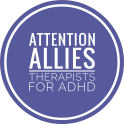An individual approach to ADHD
One size doesn't fit all
Most people who have been diagnosed or identify as having ADHD (ADD) have had a long path to the door of counselling, psychotherapy or coaching. While the medical model is helpful for some ADHDers, there are a great many for whom it is part of the problem or who feel it has failed to provide them with the sorts of answers they are looking for.
Medical models necessarily become quite reductive (although in medicine there are strides and understandings currently surging forward that one size doesn't fit all). At Attention Allies we feel fortunate through personal, family and professional experience to be well ahead of this curve. We provide open-minded, modern and progressive approaches to working with ADHD (ADD and other neurodiversities) at our Bristol and online practices.
Resources
- The Attention Allies blog site has articles on a wide rage of ADHD-related topics including: RSD; Being normal; Addiction; Systems, structure and creativity; and Diagnosis. The blog is constantly growing, so do visit often.
- The Adult ADHD Self-Report Scale (ASRS) in this link consists of the 18 criteria used for establishing ADHD that was set out in the Diagnostic and Statistical Manual version 4, text revision (DSM IV-TR). According to the ASRS, six of the 18 questions were found to be the most predictive of symptoms consistent with ADHD. These six questions form Part A of the Symptom Checklist. Part B of the Symptom Checklist contains the remaining twelve questions. Click the following link to view The Adult ADHD Self-Report Scale (ASRS-v1.1).
- If you live in England and are registered with a GP surgery and your GP has referred you to a consultant or specialist in mental health, you now have the a legal right to choose who that mental healthcare provider or mental healthcare team is. This means that you don't always have to wait for an ADHD assessment on the NHS but that you can use another provider. Click here to read more details of this important right.
- The Bristol Adult ADHD Support Group is a "peer support group with the aim of bringing together people with shared experiences, to treat everyone’s experiences as being equally important, to involve people in both giving and receiving support, and to provide a space where people feel accepted and understood". Click to visit their web page.
- A recent statement from the Royal College of Psychiatrists welcomes NHS England, alongside Government, announcing that they will be launching a new attention deficit hyperactivity disorder (ADHD) taskforce to improve care for people with ADHD.
Links
- You can visit our founder's own website at Therapy Place Bristol. Duncan offers individual and couples counselling, psychotherapy and coaching in Bristol and North Somerset. He works in person, online and as a ‘walktalk’ therapist in urban, coastal and country locations around Greater Bristol.
- The ADHD Foundation describe their charity as "the UK’s leading neurodiversity charity, offering a strength-based, lifespan service for the 1 in 5 of us who live with ADHD, Autism, Dyslexia, DCD, Dyscalculia, OCD, Tourette’s Syndrome and more". You can visit them at: www.adhdfoundation.org.uk
- The UK Adult ADHD Network (UKANN) was established in 2009 to provide support, education, research and training for mental health professionals working with adults with ADHD. The network was established I response to UK guidelines from NICE and British Association for Psychopharmacology which for the first time gave evidence based guidance on the need to diagnose and treat ADHD in adults as well as in children; and in response to the relative lack of training and support in this area for professionals working within adult mental health services.
- ADHD UK describes itself as being "by people with ADHD for people with ADHD" and here is their link.
- ADHD Aware is a national charity that helps people impacted by ADHD. You can find out more about them at this link.
Trusted Colleagues
Although our directory lists the Attention Allies core therapists, from time to time we feature below trusted colleagues who offer ADHD-informed therapy online.
Jenni Flight of Bumpstead Counselling is MBACP Accredited and has many years' experience in private practice, as well as work in charities, schools and employer-assisted programmes throughout Essex, Winchester and surrounding regions. Jenni has a special interest in supporting people with ADHD and ASD, offering online therapy and DBT skills. She works creatively to adapt her approach for those seeking assessment or managing diagnosis.
